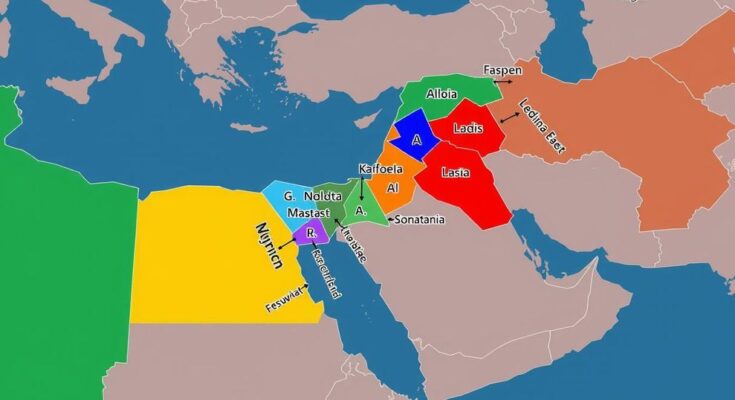Recent mapping by Newsweek reveals a divided Middle East in response to the Syrian civil war, with Russia and Iran supporting President Assad, while Turkey and Gulf states back opposition forces. The evolving positions of these regional powers reflect complex political dynamics, influenced by local geography and historical ties, underscoring the ongoing impact of the conflict.
The geopolitical landscape of the Middle East remains distinctly divided in response to the ongoing Syrian civil war, as recent mapping by Newsweek illustrates. The conflict, which intensified in 2012, has drawn significant international involvement, notably from Russia and Iran, who have sustained support for President Bashar al-Assad’s government. Russia initiated military intervention in 2015, deploying troops to bolster Assad’s forces, highlighting the strategic alliance between these nations.
In contrast, various regional powers back opposing factions. Turkey prominently supports rebel groups such as the Armies of Conquest. Despite a shared initial response wherein Saudi Arabia, Bahrain, the United Arab Emirates (UAE), and Qatar condemned Assad, their positions have evolved toward a more conciliatory approach in recent years. Oman has distinguished itself by maintaining diplomatic ties with Assad and adopting a more moderate rhetoric. Furthermore, Yemen has been notable as a supportive voice for Assad, positioning itself alongside the Houthi forces in the conflict.
Countries closer to the conflict exhibit a spectrum of responses. Israel, bordering Syria, has opted for neutrality, reflecting a cautious stance amid the turmoil. Lebanon’s complex situation entails an official stance of neutrality accompanied by substantial support from Hezbollah, which aligns with Assad, complicating Lebanon’s political landscape. The refugee crisis resulting from the civil war has intensified Lebanon’s challenges.
Political instability in other regions, such as Libya, has inhibited clear positions regarding the Syrian conflict, reflecting broader regional complexities. Additionally, entities like the Palestinian territories and Western Sahara remain particularly vulnerable, lacking both formal recognition and diplomatic engagement on the issue.
The analysis underscores the fragmented nature of alliances and oppositions within the region as stakeholders grapple with the multifaceted implications of the Syrian civil war on their political dynamics and national interests.
The Syrian civil war, which began in 2011 and escalated dramatically in 2012, has not only devastated the nation but has also drawn in numerous regional and global powers, exacerbating the crisis further. The involvement of countries such as Russia and Iran in supporting the Assad regime contrasts sharply with the backing of various rebel groups by nations like Turkey and several Gulf states. This complex interplay reflects each country’s diplomatic motivations, geopolitical strategies, and regional rivalries, shaping the broader Middle Eastern context during a time of significant upheaval. Moreover, the varying stances adopted by different states showcase how local geography and historical ties influence the responses to the civil war.
In summary, the Syrian civil war has served to highlight the deep geopolitical divides within the Middle East, characterized by varied alliances and oppositional forces. Nations such as Russia and Iran have sided with Assad, while regional players like Turkey and certain Gulf states have backed the opposition. Furthermore, the distinct strategies employed by countries like Oman and Israel illustrate the nuanced positions influenced by each state’s unique circumstances. The implications of these alliances continue to shape the region’s political landscape as challenges from the civil war persist.
Original Source: www.newsweek.com




